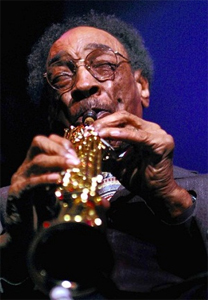RIP SAM RIVERS

The Godfather of Free Jazz
by Gary Gomes
(February 2012)
Sam Rivers was one of those musicians whose influence far outweighed his name recognition. Well-known within the jazz and free jazz communities, his career spanned the blues, bebop, and free jazz, while being an active supporter and organizer of the free jazz community, especially the loft scene of the 1970's.
Rivers' career included stints in blues bands, and he played with several bebop legends, including Tad Dameron and Herb Pomeroy. He also studied with iconoclastic composer Alan Hovanhess. When he came to Boston in the mid-1960's, he crossed paths with a young Tony Williams, and this meeting led to him playing on Tony Williams' Life Time album (1964) on Blue Note records, and also to a short tenure with Miles Davis (Miles in Toyko, available as a Japanese import). Rivers also appeared on albums with other Blue Note eccentric mainstays, like the genius pianist and composer Andrew Hill (Change, 1966), and Larry Young (Khalid Yasin), the almost inimitable organist (appearing together on Young's Into Something', 1964). Rivers was also a member of Cecil Taylor's bass-less quartet with Jimmy Lyons (alto sax) and Andrew Cyrille (drums), which I would personally argue was Taylor's most ambitious and exciting ensemble, responsible for the extended piece The Second Act of A, issued in the United States at The Great Concert of Cecil Taylor on Prestige records.
Rivers' later sessions progressed into work with people like Cecil McBee, and Norman Connors or Barry Altschul (ABC Impulse) in trio formats, with David Holland (the marvelous Conference of the Birds on ECM) and even incredibly complex, atonal compositions with a big band on Crystals (ABC Impulse). Crystals was even more challenging than Anthony Braxton's orchestral music, and less accessible. It seemed a jazz version of Arnold Schoenberg--knotty, almost serialistic, dense compositions.
He was also one of the primary people responsible for the loft jazz scene that emerged in New York in the 1970's and helped nurture talent as diverse as Oliver Lake, David Murray (both later of the World Saxophone Quartet) and Stanley Crouch, who began his jazz career as a free jazz drummer (Crouch later became the embodiment of the musical conservatism in jazz journalism that laid the foundation for the exalted status in which Wynton Marsalis is now held). The loft jazz scene, with recordings at Studio Rivbea, the loft owned by Sam Rivers and his wife Bea, is partially documented on a series of five albums issued on Douglas records called Wildflowers.
Rivers himself was not a wild-eyed musical radical with no foundation in more traditional forms--he was, as much as many of the more conservative current self-appointed academic saviors of jazz, grounded heavily in bebop and like Eric Dolphy and John Coltrane, straddled both worlds comfortably.
He was a virtuoso on every instrument he played--tenor saxophone, soprano saxophone, flute and piano. Although his piano playing seemed influenced by the great Cecil Taylor, his touch was different, and his rhythmic orientation was very different from Taylor's, so he was not an imitator. As a tenor saxophonist, he was in a league with Coltrane, Rollins and Joe Henderson; as a flutist and soprano saxophonist, the recorded evidence shows him as one of the best.
Although he moved to Florida in his later years, he stayed active in music, often organizing large ensembles where he lived and organizing jazz concerts, as he had done in New York. He was both a skilled teacher and performer.
A personal remembrance: It is one thing to form an impression of a person through his music. It is more telling to actually meet the musician and form a direct impression of him. I was actually privileged to meet Sam Rivers three times--at University of Massachusetts Amherst in 1973, at Amherst College in 1974, and at University of Massachusetts Dartmouth in 1977. The first, most telling meeting was sitting in an audience at University of Massachusetts Amherst while he explained free jazz composition to an audience of musicians. He was very systematic, and even showed the musicians how to notate saxophone squeals (high harmonics) on a musical staff. He explained it very clearly, without artifice. He was a teacher, pure and simple. The second time was after an unfortunate meeting I had with Keith Jarrett at Amherst College. I said something that upset Jarrett (in the light of years, I can understand why it went badly, and it was a miscommunication between us), and the interview crumbled before my eyes. I plucked up my courage and asked Mr. Rivers, who was headlining the same bill, if I could interview him. He agreed in a kind and polite manner. Barry Altschul and Cecil McBee (who was practicing his bass) were standoffish while Sam was sociable and engaging. That was my experience with Mr. Rivers at University of Massachusetts Dartmouth as well. Here was a super talent in the field--a giant who had played with giants--and he was one of the nicest people I ever met!
Sam Rivers was a giant talent whose contributions to the arts will be missed--he also had that rare trait (said also to be true of Eric Dolphy), that one could not remember the bad things about him. He was both a genius as a musician and even a genius as a human being.